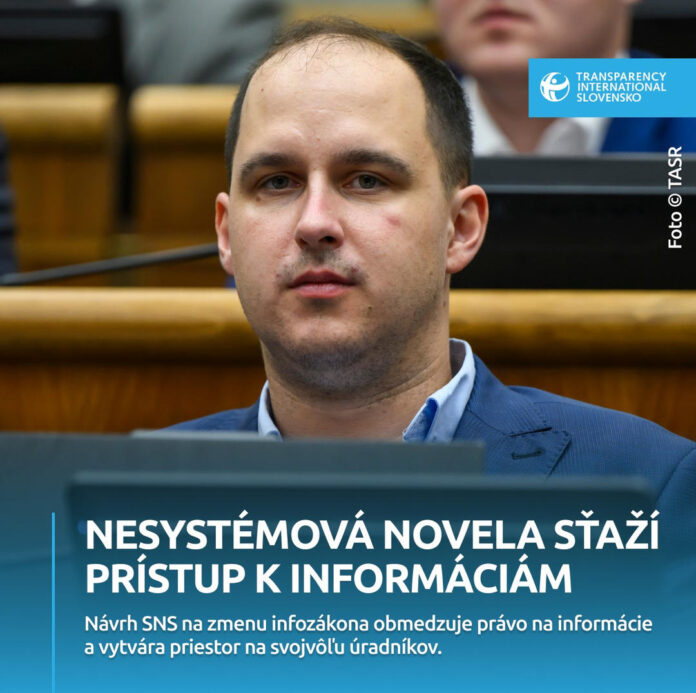In response to a proposal from the Slovak National Party (SNS) to extend the deadline for providing public information, several Slovak NGOs have raised concerns about potential impacts on transparency. The SNS proposal seeks to lengthen the response time for information requests and suggests fees for extensive searches, changes that NGOs warn could limit citizens’ access to information and hinder public oversight of government activities.
Bratislava, 5 November 2024
Members of the Slovak National Party (SNS) propose extending the basic time frame for providing information to citizens from the current 8 days to 12. This suggestion follows just months after the same party’s MPs proposed charging fees for accessing information, cloaking their intent in the vague term “extraordinarily extensive searches.”
NGOs VIA IURIS, the Stop Corruption Foundation (Nadácia Zastavme korupciu), Transparency International Slovakia, INEKO, and the Ján Kuciak Investigative Centre warn that SNS’s proposals severely restrict the right to information and create significant potential for arbitrary actions by state officials.
Information Only for Those Who Can Pay?
For decades, the information law—initiated with the help of civil society—has guaranteed the right to request any non-confidential information from the state, obliging officials to respond within 8 business days.
In May, SNS introduced a bill amendment mandating fees for “extraordinarily extensive information searches.” Under this system, authorities could independently decide which information requests are “too extensive,” making information accessible only to those able to pay. The original proposal did not include a mechanism for applicants to challenge fees. Today, MPs suggest adding such a mechanism, though it’s still unclear how objections will be addressed.
Furthermore, what constitutes an “extraordinarily extensive search” or what costs are deemed “purposefully incurred” remains undefined, potentially leading to misuse.
“The amendment will impact media and NGOs most, as they may lack sufficient funds to pay for information requests. Ironically, it may not affect those abusing the system by overwhelming institutions with requests and having the means to pay,” said Zuzana Petková, Director of the Stop Corruption Foundation.
Only 0.7% of Information Requests Were Unmet
Proponents of extending the response time for information requests from 8 to 12 business days justify this by citing an increase in both the number and complexity of requests. However, data suggests otherwise.
In 2021, VIA IURIS examined information law practices. Data from January 2020 to August 2021 shows that ministries and the government office handled roughly 6,800 requests, averaging only 24 requests per month per office, with only 0.7% of requests not processed within the legal timeframe.
Transparency International Slovakia’s analysis reveals that even Slovakia’s 100 largest municipalities, receiving fewer than 200 requests annually on average, have not faced a significant backlog. Bratislava and Košice increase this average, while smaller towns handle far fewer requests.
A recent Transparency study found that the country’s 100 largest state companies received a total of 902 requests in 2023, averaging less than one request per company per month. The National Motorway Company, which received the most requests (127), managed to respond within the standard 8-day or extended 16-day period.
“Proponents are addressing a non-existent issue. The sole effect of their actions will be to make it harder for active citizens and journalists to access state information, weakening public oversight and the fight against corruption,” explained Katarína Batková, Director of VIA IURIS.
A Constitutional Right Impacted Without Discussion
NGOs oppose the proposed deadline extension and highlight three fundamental issues:
1. The proposal undermines the constitutional right to information, introduced as a last-minute amendment in the parliamentary second reading without any public debate.
2. Current law already allows authorities to extend the 8-day response time by an additional 8 days if the request is complex or extensive, granting up to 16 business days.
3. Proponents have failed to provide data validating their claim of increasing request numbers or complexity as a reason for delays.“Easy access to information empowers governments to work with citizens in addressing shortcomings and improving public services. The SNS proposal, unfortunately, sees this oversight as a threat rather than an opportunity,” commented INEKO’s Dušan Zachar.
“We already see cases where state institutions fail to answer journalists’ questions, preventing them from holding officials accountable. Any restriction on the information law will exacerbate this situation, further undermining the public’s constitutional right to information,” added Lukáš Diko, Chair of the Ján Kuciak Investigative Centre.
Authors:
Katarína Batková, VIA IURIS
Zuzana Petková, Stop Corruption Foundation
Ján Ivančík, Transparency International Slovakia
Dušan Zachar, INEKO
Lukáš Diko, Ján Kuciak Investigative Centre







